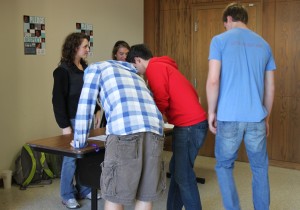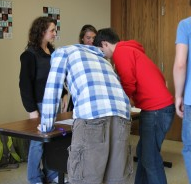The Special Olympics Club sponsored the second annual “Spread the Word to End the Word” campaign this week, where students pledged to stop saying the word “retard” or “retarded.”
The event is part of a larger “r-word” national campaign by the Special Olympics, which started in 2008.
Members of the club were outside the Grill and the cafeteria during lunchtime every day of the week with pledge sheets. The club’s goal is to get 2,000 pledges. Last year the group collected 1,300 pledges.
Club president and senior Addison Farrell said this is the first year there is an actual club at St. Thomas.

“It’s amazing because I have people come up to me and say, ‘Finally we have a club. Thank God we have a club,’ because last year it was just a campaign,” Farrell said.
Now that there is an established club, Farrell said the response has been tremendous.
“We have about 30 members just in our first year, and I have people email me almost every week,” Farrell said.
Sophomore club member Brittany Patterson teaches gymnastics to children with intellectual disabilities. Patterson said she likes the campaign, which caught her attention last year when she first started coaching.
She said the campaign made her realize “I shouldn’t use that word because I used to use it all the time.”
Five members of the club have siblings with special needs, according to Farrell, and other members joined because they know someone with intellectual disabilities.
Junior Logan Crotty said she pledged because she was friends with a boy named David in her school who had developmental disabilities.
“There are more similarities than differences between us,” Crotty said.
She added that she thinks it’s important to educate people that the word is wrong.
Crotty said her relationship with David “made me recognize the importance of caring for my language and what impact that might potentially have on other people.”
Patterson agreed and said now “every time I hear the word it just makes me cringe.”
Raising awareness through events
In its first year as a club, the group has promoted events such as the Polar Bear Plunge in January and more recently held a day of silence Wednesday, May 4. Members wore shirts promoting the day and wrote down whatever they needed to say instead of speaking it out loud.
The day of silence was new this year, Farrell said, and the club decided to do it because they “wanted to represent those that couldn’t speak.”
Patterson said she participated in the day of silence and found it “very difficult,” but said when she wrote down why she was being silent, some classmates “thought it was really cool.”
The club attended the Tommie Twilight women’s track and field meet Wednesday, May 4, with Kristina Fritz, a Special Olympics athlete who will be attending the Winter Games in Greece. The club raised awareness for the campaign and hoped to raise money for Fritz’s trip to Greece.
The focus of the Special Olympics club is volunteering, and Farrell said the club has a vision for the future that involves St. Thomas athletes.
“We’re working with MIAC in order to create an athletic program here on campus where we actually join a person here, like let’s say you take a football player, you actually pair him up with another athlete in the Special Olympics,” Farrell said. “It’s like a mentor program, so it’s an athletic mentor program.”
The club wants “to have every athlete on campus paired up with someone with intellectual disabilities,” Farrell said.
The club hopes to spread awareness locally as well.
“One of our initiatives for the years to come is to actually go to local grade schools and high schools and let them know that … you need to stop using this word.”
The passion for all these events comes from the athletes themselves, Farrell said.
“It’s not us who’s really inspiring them but more them inspiring us … it’s almost a selfish thing,” Farrell said. “I’ve got to hang out with some of these athletes because they’re just going to make me better.”
Lizzy Schmitt can be reached at schm9587@stthomas.edu.




Reiterating my comments from last years article, I find these groups rather troubling. I am not fundamentally against groups which ask us to be nice and not use offensive langage. However, these movements are shortly followed by zealots who scold even the appropriate use of the word retard. So, while I support these groups in some sense, I deplore their members who often refuse to acknowledge the contexts of a sentence and abandon critical thinking in the pursuit of their cause.
Paul, potentially aside from quoting some work of literature, what would you consider an appropriate use of the word? Offhand I can’t think of one.
The rain retarded the race.
From Merriam-Webster
Definition of retardTransitive verb1: to slow up especially by preventing or hindering advance or accomplishment : impede2: to delay academic progress by failure to promote
Ah, now I understand what you mean. Alternate standard meanings of the same term. Don’t really think that’s what folks are concerned about, but rather it’s use in a directly derogatory fashion or as a lazy synonym for “lame,” “silly,” etc.